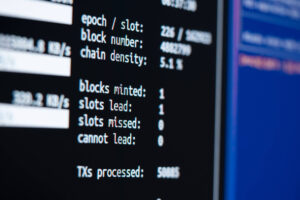A smart contract is a self-executing contract where the terms of the agreement are written directly into the code. It automates, verifies and enforces the terms of a contract without the need for intermediaries such as lawyers or notaries, reducing the risk of disputes and fraud.
Smart contracts use blockchain technology. When parties enter into an agreement, the terms of the contract are translated into code and stored on a blockchain, a decentralized and tamper-proof ledger. Once the conditions set out in the contract are met, the contract is automatically executed, transferring assets or performing actions as agreed.
Example of a smart contract
In a real estate transaction, for example, the smart contract could automatically transfer ownership of the property to the buyer as soon as payment is received, eliminating the need for a title company or escrow service. Today, smart contracts already form the basis of a multi-billion dollar decentralized finance sector in the blockchain world (DeFi). Users can use decentralized applications to exchange their digital assets or deposit them as collateral in a credit protocol. The advantages of smart contracts can be summarized as follows:
- Efficiency: Smart contracts reduce the time and costs associated with traditional contract execution. There is no paperwork, no manual verification and no middlemen, streamlining the process.
- Transparency: Transactions and contract execution are recorded in the blockchain, creating a transparent and immutable history of all actions that can be verified by the parties involved.
- Security: The decentralized nature of the blockchain makes it extremely secure against manipulation or hacker attacks. Once a contract is on the blockchain, it is almost impossible to change it without consensus.
- Trust: Smart contracts are trustless, meaning parties can rely on the code and the blockchain network instead of trusting a central authority. This is particularly valuable in situations where trust plays a role.
Challenges
Although smart contracts offer numerous benefits, there are also challenges. Legal recognition and enforcement of smart contracts can vary by jurisdiction, and there can be ambiguities in complex agreements that require human interpretation. In addition, the code underlying smart contracts must be written correctly to avoid vulnerabilities or unintended consequences. Security breaches or coding errors can lead to significant financial losses.
In summary, smart contracts are a transformative technology that has the potential to revolutionize the way agreements are made and executed in various industries. By automating and improving the reliability of contracts, they offer efficiency, transparency and security, albeit with some legal and technical challenges that will need to be resolved as adoption increases.









